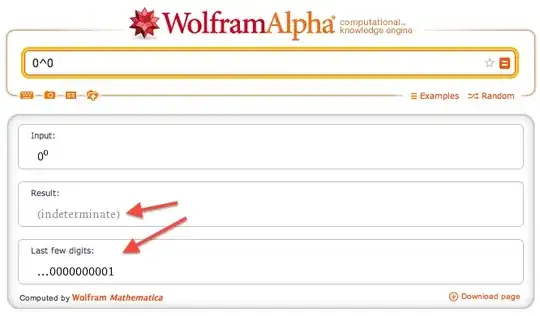Can anybody explain how this comes about?

$0^0$ is "indeterminate" in the sense that if $f(x),g(x)\to0$ as $x\to\text{something}$, then $f(x)^{g(x)}$ could be any positive number or $0$ or $\infty$, depending on which functions $f$ and $g$ are. But the limit is $1$ if $f$, $g$ are both analytic [Apparently I'm missing a hypothesis here . . . ], and it's $1$ if $(f(x),g(x))$ approaches $(0,0)$ from within a sector bounded by two lines of positive slope.
But also, $0^0=1$. This is seen in things like $$ e^z = \sum_{n=0}^\infty \frac{z^n}{n!}, $$ where the first term is $\dfrac{z^0}{0!}$, and that term will fail to be $1$ when $z=0$ unless $0^0$ is $1$. That $0^0=1$ is a fact arising in combinatorics, set theory, and probability from the fact that $0^0$ is an empty product, i.e. a product of no numbers at all; hence is equal to $1$ since not multiplying by anything is the same as multiplying by $1$.
(But I don't know why Wolfram Alpha expressed it in that odd form.)
Well in set theory $0^0$ is defined and not indeterminate. $0^0$ is the number of functions from the empty set to the empty set. There is exactly 1 function from the empty set to the empty set.
In Analysis $0^0$ is often not not defined as there are limits of the form $0^0$ which are indeterminate. Sometimes $0^0$ is defined to be $1$ in analysis as for example $$\lim_{x\to 0} x^x =1$$
In my personal opinion I guess it is a joke and that last few digits and stands for $$00000000\dots 00001$$
The definition $0^0$ is very convenient as mentioned in comments, it avoids a lot of special cases.
It's a bit funny that Wolfram Alpha doesn't reproduce this one here
Wolfram Alpha calculates "last few digits" if you input large numbers such as 12^12^12, but not if you input a small number such as 2^2^2. I think it simply preemptively mistakes 0^0 for a large number, and calculates its last few digits for you, and since 0^0 is defined as 1, you simply get ...000001.
Wolfram Alpha gets really confused if you enter 0^0^0, where it seems to evaluate at least one instance of 0^0 as the limit Indeterminate rather than the number 1, and it replies with the raw code ChineseRemainder[{Indeterminate, Indeterminate}, {0000001024, 0009765625}].
This was clearly a bug. It's been fixed, as have the higher order towers.